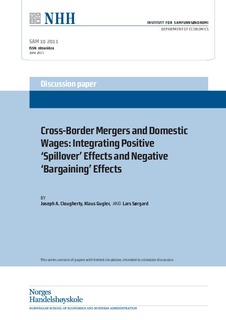Cross-border mergers and domestic wages: integrating positive 'spillover' effects and negative 'bargaining' effects
Working paper

View/
Date
2011-06Metadata
Show full item recordCollections
- Discussion papers (SAM) [649]
Abstract
The existing literature concerning the impact of cross-border merger activity on domestic
wages can be split into two camps: 1) those focusing on positive ‘spillover’ effects; 2) those
focusing on negative ‘bargaining’ effects. Motivated in part by the lack of scholarship
spanning these two literatures, we provide a theoretical model that nests these two
mechanisms in one conceptual framework. From our theoretical model we are able to
predict that ‘spillover’ effects tend to be more dominant under low unionization rates, while
‘bargaining’ effects tend to be more dominant under high unionization rates; furthermore,
‘spillover’ effects tend to be more dominant with inward cross-border mergers, while
‘bargaining’ effects tend to be more dominant with outward cross-border mergers. We
employ comprehensive panel data on wages, unionization and merger activity for US
industry sectors over the 1986-2001 period in order to test the impact of cross-border
merger activity on domestic wages. We find support for our propositions in that higher
unionization rates make it more likely that cross-border mergers generate wage decreases,
while outward cross-border mergers more likely involve wage decreases than do inward
cross-border mergers.